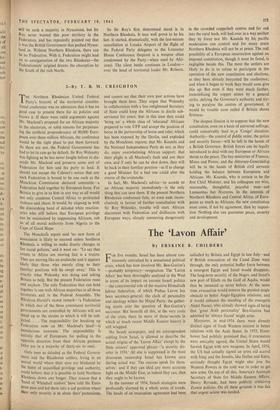2—By T. R. M. CREIGHTON T HE Northern Rhodesian United Federal
Party's boycott of the territorial constitu- tional conference was an admission that it has no good case to present there for its policies and knows it. If there were valid arguments against Mr. Macleod's proposal for an African majority in the electorate, or solid reasons for perpetuat- ing the artificial preponderance of 80,000 Euro- peans over three million Africans, the conference would be the right place to put them forward. As there are not, the Federal Government has had to let its case go by default. Sir Roy Welensky was fighting as he has never fought before to dis- credit Mr. Macleod and preserve some sort of Federation for him and his party to lead. It should not escape the Cabinet's notice that any such Federation is bound to be one such as the Monckton Commission declared untenable—a Federation held together by European force. For Britain to give in to him in any way at all would not only condemn Central Africa to protracted violence and chaos. It would, by aligning us with the diminishing band of deluded white reaction- aries who still believe that European privilege can be maintained by suppressing Africans, rob us of all moral authority from Algeria Jo the Cape of Good Hope.
The MoncktOn report said `no new form of association is likely to succeed unless Southern Rhodesia is willing to make drastic changes in her racial policies,' and it went on : `To say that events in Africa are moving fast is a truism. They are moving like an avalanche and it appears likely that those who merely cling to their familiar positions will be swept away.' This is exactly what Welensky was doing and asking Britain to help. But the present Federation must end anyhow. The only Federation that can hold together is one with African majorities in all three territories and in the Federal Assembly. The Rhodesia Herald's recent remark—`a Federation in which two of the three constituent territorial governments are controlled by Africans will not stand up to the strains to which it will be sub- iected. . . . The responsibility for breaking up Federation rests on Mr. Macleod's head'—is mendacious nonsense. The responsibility is entirely that of Europeans for pulling in the opposite direction from their African partners (who are in a majority of thirty-six to one).
Only men as deluded as the Federal Govern- ment and the Rhodesian settlers, living in an Unreal world where their eyes are blinkered by the habit of unjustified privilege and authority, could believe that it is possible to hold Northern Rhodesia down any longer. They reason that a `band of Whitehall traitors' have sold the Euro- pean pass and led them into a sad position where their only security is to abate their pretensions, and cannot see that their own past actions have brought them here. They argue that Welensky in collaboration with a less enlightened Secretary of State could keep the Africans in docile sub- servience for years; that in this time they could 'bring on' a whole class of 'educated' Africans prepared to vote UFP and accept the position of horse in the partnership of horse and rider, which has been exposed by the Devlin, and exploded by the Monckton, reports; that Mr. Kaunda and the National Independence Party do not, as they do, enjoy overwhelming African support; that their plight is all Macleod's fault and not their own, and if only he can be shot down, they will be back in their familiar position—as if to change a good Minister for a bad one could alter the course of the avalanche.
In fact, Mr. Macleod's advice—to accede to an African majority immediately—is the only thing that can save them. If the present Northern Rhodesian conference fails, or even ends incon- clusively in favour of further consultation with Sir Roy Welensky, trouble will start. African discontent with Federation and disillusion with European ways, already simmering dangerously in the crowded copperbelt centres and far out into the rural bush, will boil over in a way neither they by force nor Mr. Kaunda by his pacific moderation can control and for many years Northern Rhodesia will not be at peace. The real possibility of a European insurrection against an imposed constitution, though it must be faced, is negligible beside this. The most the settlers are likely to do is to refuse to participate in the operation of the new constitution and elections, as they have already boycotted the conference; and when it began to work they would soon give this up. But even if they went much farther, immobilising the copper mines by a general strike, defying the Governor's authority and try- ing to paralyse the centres of government, it would be trouble soon ended if Britain shows firmness.
The deepest illusion is to suppose that the new constitution, even on a basis of universal suffrage, could conceivably lead to `Congo' situation. Authority—the control of public order, the police and security forces—will be left in the hands of a British Governor. British forces can be legally introduced to deal with any European or African threat to the peace. The key ministries of Finance, Mines and Power, and the Attorney-Generalship will be in the hands of British civil servants holding the balance between Europeans and Africans. Mr. Kaunda, who is certain to be the first Chief Minister, and his colleagues are wise, reasonable, thoughtful, peaceful men—not Lumumbas but Nyereres. In the interests of Northern Rhodesia and Central Africa, of Euro- peans as much as Africans, the new constitution must come, if not by agreement, then by imposi- tion. Nothing else can guarantee peace, security and development.










































 Previous page
Previous page